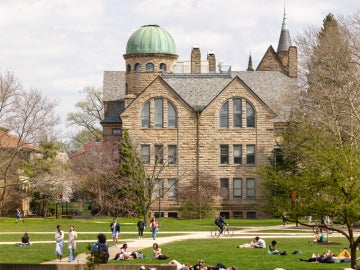Shari Rabin Awarded Research Fellowship from National Endowment for the Humanities
January 7, 2021
Amanda Nagy

Assistant Professor of Jewish Studies and Religion Shari Rabin.
Photo credit: Tanya Rosen-Jones '97
Assistant Professor of Jewish Studies and Religion Shari Rabin has received a fellowship from the National Endowment for Humanities to pursue research and writing leading to publication of a book narrating the history of Jewish people in the American South, from 1669 to the present day.
The project builds on Rabin’s first book, Jews on the Frontier: Religion and Mobility in Nineteenth-century America, which traced the development of American Judaism in the period of westward expansion, focusing on how ordinary Jews created religious lives in new places.
“Now, I am working on a particular region and expanding the timespan, tracing how shifting local conditions shaped the status of Jews and the development of Jewish religious life,” says Rabin, who recently published an article dealing with Judaism in the U.S. South in The Immanent Frame, and co-authored a piece forthcoming in the Journal of Southern History. This new book project will tell a more expansive history across four centuries.
Rabin explains that much of her scholarly work has been interested in understanding how Jewish religious life develops in places where people might be surprised to find it.
“This can probably be traced to my own upbringing in Wisconsin and my family's move to Georgia when I was 13, which felt like a very abrupt culture shock at the time,” she says. “I left after high school, but my mother still lives in Atlanta, and before coming to Oberlin I lived and taught for four years in Charleston, South Carolina. Moving in and out of the South, I have been struck by how southern Jews have developed a strong sense of regional identity, even as their history highlights broader—if sometimes underappreciated—themes in Jewish, southern, and American histories. In particular, studying Jews in the South centers important questions about race, religion, and how they operate and intersect in different contexts.”
With the fellowship, Rabin will undertake research trips to the National Archives in Washington, D.C., the American Jewish Archives in Cincinnati, and various archives throughout the South (pending COVID-19 travel safety protocols).
Rabin notes that while there are “quite a few Jewish community histories focused on particular southern cities,” as well as a number of edited volumes and more focused monographs, this project is the first attempt at a single-authored scholarly narrative.
“The closest antecedent is Eli Evans’ The Provincials, published in 1973, which is a mix of memoir, travel writing, and history, and which initiated the field of scholarship that I am now drawing and building upon.”
Rabin’s interest in southern Jewish history has found its way into the courses she teaches, including "Introduction to Jewish Studies: Sacred Spaces and Promised Lands" and "American Religious Traditions.” Her scholarly work will also be incorporated in “Judaism in the U.S.: State, Synagogue, and Beyond" this spring.
“I love introducing students to Charleston's fascinating Jewish history (it is home to the second oldest extant synagogue building in the U.S.) and to material on southern Jewish foodways. In the future, I would also love to work with students in some capacity on regional Jewish histories and cultures of the Midwest. I find that taking a more localized approach can be a really powerful way to understand the complexities and layers of human experience, and focusing on Jews in particular offers a different perspective on places we think we know.”
You may also like…
Oberlin Launches Critical AI Studies Minor in Fall 2026
With a solid foundation in both science and the humanities, this minor ensures students to understand and be able to analyze the ethical, cultural, environmental, political, economic, technological, and labor effects of AI.
Chudi Martin Jr. ’24 Earns Prestigious Gates Cambridge Scholarship
Chudi Martin Jr. ’24 earns prestigious Gates Cambridge Scholarship.
Oberlin Named a Top Producer of Fulbright Students for 2025-26
Oberlin College and Conservatory was named a Top Producer of Fulbright students for the 2025-2026 academic year.


